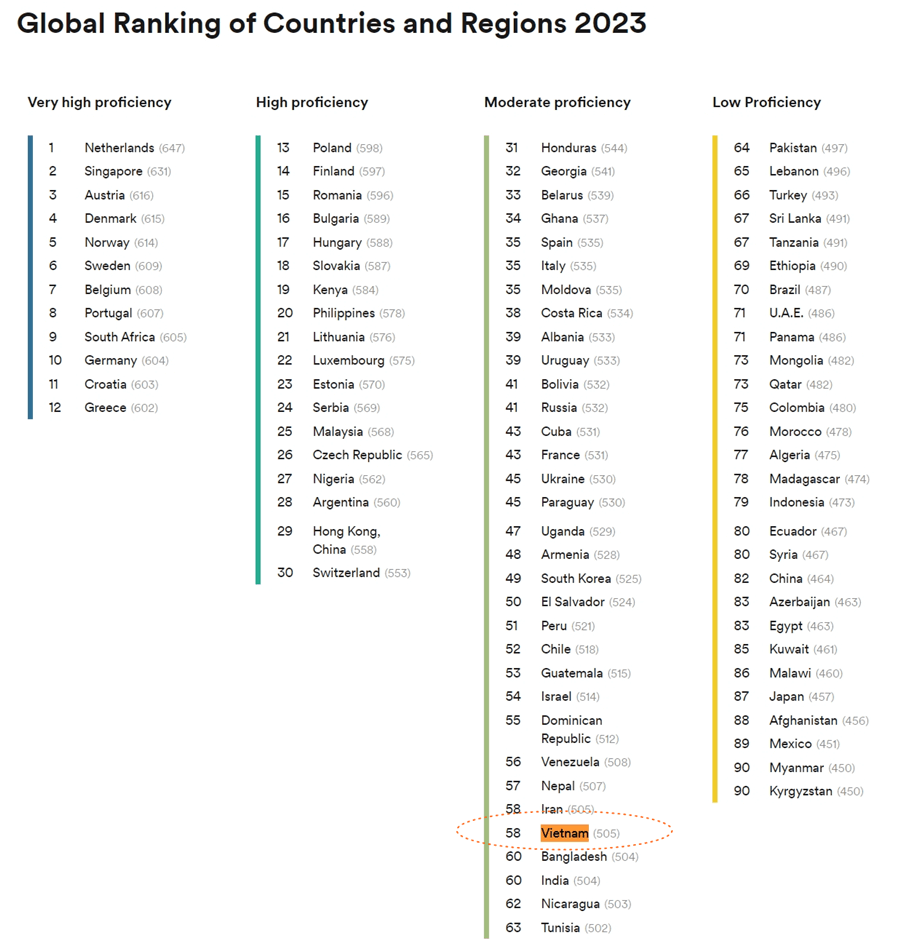In 2024, the Vietnamese government would like to improve English education and recognize it as a second language in the future.

However, teaching and learning English as an international language still influences positive results. Many students can write and read, but speaking is not fluent.
1. Learning English in Vietnam:
Each person studies English for each purpose. In general, studying this foreign language has a few purposes:
- To find a better job in the future. Indeed, most Vietnamese speak English well; they can get higher job opportunities and a better salary. This fact makes many people try to learn it to get its certificate for showing, not actually for use, which may cause bad results.
- To go abroad. Many young Vietnamese students learn English with IELTS certificates, which is preferred to get a better chance to pass the conditions of international schools to fulfill their studies.
- To move to live in other English-speaking countries, such as the United States, Canada, New Zealand, or Australia. In this situation, people need English to communicate in daily life. However, this group is smaller than the two groups above.
In short, learning English has become a trend in Vietnam. English is also taught in almost all secondary schools, high schools, and universities. However, parents often spend a lot of money and time with their children, going to English education centers to learn more.
For Vietnamese people who want to learn English, offline classes are preferred over online courses. This opens up more opportunities for teaching language services, such as English tutors, English-speaking clubs, and IELTS training.

2. Teaching English in Vietnam:
Recognizing the importance of English, Vietnam has an extended program for teaching and learning it in almost all schools.
However, teaching English in secondary, high schools, and universities does not meet the good purposes admired.
The leading cause is the use of wrong methods in education. Most books and schools focus on Writing and Reading and ignore Speaking and Listening.
The results of this education process make many students unable to speak when meeting foreign guests. Even though many teachers in the schools cannot speak English fluently with foreigners, this influences the quality of teaching and may affect learners’ abilities.
Besides, organizing a class in schools is not suitable for improving English. On average, a class has 30 students and over, leaving not enough time for teachers to pay attention and guide all of them in practicing it.
3. Chances for English education in Vietnam:
The above limitations in learning and teaching English in Vietnam create good chances for people working in education to fix the spaces.
Many English centers in Vietnam do well. They supply extra lessons to improve various skills for using this language.
These centers focus first on pronunciation, listening, speaking, reading, writing, and grammar, which is the opposite of many regular schools.
If you are an English teacher who wants to teach in Vietnam, you can easily find a school or center that offers a job. However, you must prepare basic teaching requirements, including university graduation and a teaching English certificate.
Also, if you are a tourist and want to support English-language learners when visiting Vietnam, that is great. To do this, please arrange a short walk around Hoan Kiem Lake in Hanoi or along the Perfume River in Hue City. You may find many students who often come to try to communicate with you in English.


